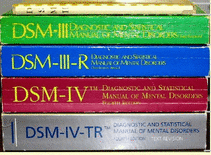|
A recent New York Times article has stirred up a lot of concern about the coming revisions of the diagnostic criteria listed in the fifth edition of the Diagnostic and Statistical manual (DSM V). Autism specialist Paul Meier shares his comments on the controversy and the upcoming changes in the DSM V.  DSM V proposed revisions I will probably be taking an unpopular position. However, I want to calm some people who are legitimately upset as they are concerned about the well-being of their children, and the children of others, regarding the changes in the DSM-V as they pertain to autism. I do not see anyone getting undiagnosed. I do not see anyone getting services loosing those services. Hopefully I can sufficiently explain this to calm people. There is a critical flaw in the study the NY Times article relied on. They were using 1993 data for the study. In 1993 there was only the DSM-III. Asperger's and PDD-NOS were not even in the DSM. So much more has been learned about autism in the last 19 years using such old data is absurd. 19 years ago they still were not too sure what they were looking for. This would have a huge impact on the data gathered. I am guessing it was all there, but the people recording data didn't know to look for it and therefore could not record it. As someone who is around autism all day every day, and does diagnostic work, I don't think there needs to be fear about the proposed changes to the DSM coming out in 2013. I need to stay on top of all this, and intimately understand all the details and nuances. It is my job. I work with the DSM-IV and I am also familiar with the expected changes in the DSM-V. The proposed changes came out 2 years ago, and were last tweaked a year ago. The only recent change that ignited a firestorm was there was an article in the NY Times January 19, 2012. Autism, Asperger's, and PDD-NOS are all really the same thing. With recognizing that, and understanding it in an everyday clinical sense from professionals, the APA is combining the three into one diagnosis of "Autism Spectrum Disorder". This makes complete and total sense, and I support it 100%. The only question then is does the new diagnostic criteria make sense and work. Part of the problem is that a lot of people do not understand the criteria as they are now, including a lot of professionals. The autism spectrum is not a scale of mild to severe, with the diagnosis you receive depending on the severity of symptoms. Spectrum represents a diversity in individual manifestation of symptoms. The specific diagnosis depends on how you fit specific diagnostic criteria, and nothing else. The specific diagnosis also does not represent access to services. I know people with an autism diagnosis that do not qualify for services. I know people with an Asperger's diagnosis who qualify for lots of services. I know people with a PDD-NOS diagnosis who will never live independently, and fight for survival at the most basic level. It does not make any of these people more or less autistic. Despite the prevalent use of the term, there is also no such thing as mild autism. Symptom manifestation may allow for easier success in some areas of life and society, but the symptoms are still there, and still an impediment to successful functioning. I like the new proposed criteria as they are currently proposed for ASD in the DSM-V. As the firestorm seems to focus on "Section B" of the criteria, dealing with "restricted repetitive patterns of behavior" I will focus my comments there. Under the new standards two out of four would need to be met, while under current criteria one out of four need to be met. The thing is, it is NOT the same four criteria. I think the new criteria are more accurate, better defined, and may be more inclusive than what we have now. One of the additions to the criteria, which is in this section, is sensory issues. EVERY clinician I know of looks at sensory issues when diagnosing, and has for many years. EVERY person I know of who is on the spectrum has sensory issues. That is one out of the four criteria needed. I think the other three criteria in the new section B are more inclusive and better defined than the current four criteria that you need one of. This will make it EASIER to be diagnosed with this section of the diagnostic criteria, not harder. Most people have not taken the time to look at the new criteria, or know where to look if they wanted to. Pasted below is the link to the new proposed criteria on the APA's DSM web page. Look for yourself. I'll gladly answer questions about what different things mean, and explain whatever anyone wants explained. It is my opinion there is no need to panic, as natural a response as that is. We are dealing with people we love, and are afraid bad things will happen because of the proposed change. I don't think it will be a problem. Every client I have ever had, and every ASD person I have known at a "real" level, will meet these criteria. I today would not recommend diagnosis for someone who did not meet these criteria. The only difference is my supporting documentation would be placed on a different line because the formatting is different. It would not change the pre-diagnostic write-up or the eligibility. DSM V proposed revisions  Paul Meier is a professional autism consultant working with autistic children, teens, and adults in the Central New York area. In addition to being a professional Paul is autistic himself, and a parent of an autistic teen. For more information about Paul or his services check out his web page at http://www.cnyautism.com/ or he also can be reached at [email protected] and 315-559-8242.
1 Comment
|
Categories
All
Archives
December 2021
|
Photo from Hayzphotos
 RSS Feed
RSS Feed
